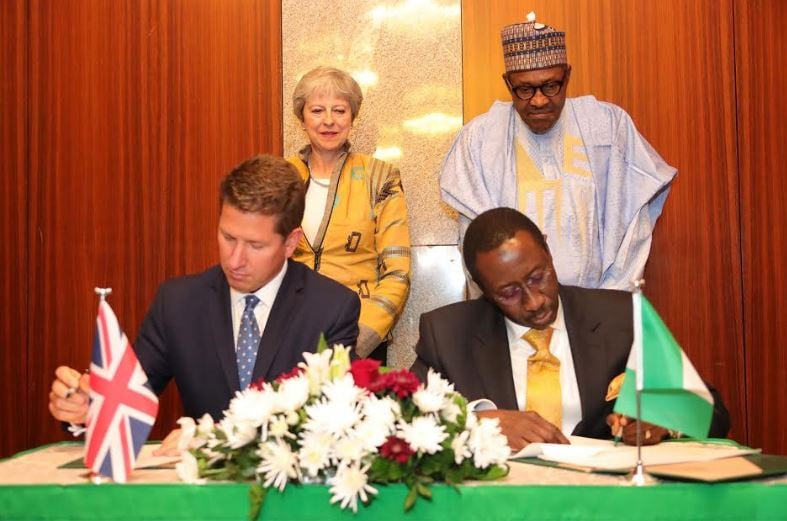
Theresa May, the Prime Minister of the United Kingdom, departed Nigeria on Wednesday, after meeting President Muhammadu Buhari; Akinwunmi Ambode, governor of Lagos state; and business leaders in Lagos and Abuja.
The Prime Minister made the visit, 30 years after Margaret Thatcher, the first female prime minister of the UK, visited the country to make deals with the former head of state, Ibrahim Babangida.
The leader of the Conservative Party in the UK embarked on this visit to strengthen trade and diplomatic relationships with Africa, ahead of a final Brexit deal with the European Union.
TheCable examines major takeaways from May’s visit and what Nigeria has to “gain or lose” from the prime minister’s visit.
NIGERIA ‘OFFICIALLY’ THE POVERTY CAPITAL OF THE WORLD
Prior to her arrival in Nigeria, May said in Cape Town, South Africa, that Nigeria is now home to the highest number of very poor people in any country of the world.
“Much of Nigeria is thriving, with many individuals enjoying the fruits of a resurgent economy, yet 87 million Nigerians live below $1 and 90 cents a day, making it home to more very poor people than any other nation in the world,” May said.
With no rebuttal from the Nigeria government, coupled with the Brookings Institution pronouncement in June, it may have become clear that Nigeria is the poverty capital of the world.
UK TO IMPROVE TRADE IN THREE OF NIGERIA’S POOREST STATES
On the grounds of Nigeria being the poverty capital of the world, the UK announced the LINKS programme worth £70 million, to tackle poverty in Kaduna, Kano, and Jigawa.
“In Kaduna 64% of the population live in poverty, rising to 70% in Kano and 88% in Jigawa,” Number 10 revealed in a statement.
“The new ‘LINKS’ programme announced by the Prime Minister, will improve the incomes of three million people in Nigeria’s poorest states, in turn reducing the drivers of conflict, instability, and migration.”
UK TO CREATE 100,000 JOBS IN NIGERIA
In order to ensure prosperity in Nigeria, the UK is working with businesses in the poorest region of the country to create 100,000 jobs, of which 40 percent will be for women, and six percent will be for people with disabilities.
Harriett Baldwin, UK’s minister for Africa, said: “Nigeria is a powerhouse of innovation and economic growth, but many Nigerians are still living in extreme poverty, with increasing numbers of ambitious young people facing a lack of jobs and opportunities.
She added that the UK’s support programme is aimed at “helping Nigeria to leave poverty behind, enabling vital business sectors to flourish, and opening up opportunities for British business partnerships”.
UK-NIGERIAN SIGN FIRST EVER SECURITY AND DEFENCE PACT

Nigeria-UK sign defence pact
The UK and Nigeria also signed the first ever security and defence pact, which is aimed at curtailing Boko Haram and improving military and police activities in Nigeria.
“Under the new partnership the UK will expand its provision of equipment and training for the Nigerian military to help them protect themselves from the threat of improvised explosive devices used by terrorists.
“This will save soldiers’ lives and better equip them to combat Boko Haram’s insurgency-style tactics. The UK has also offered to help Nigeria – for the first time – train full army units before they deploy to the North East.
“Currently, soldiers are trained individually – not in their fighting teams. Training full units will give Nigerian forces a shared understanding and experience that will make them better able to defeat the enemy.”
The pact also seeks to get 100,000 Nigerian children back to school. The financial commitment of the UK government to the pact is said to be £10.5 million.
DANGOTE MAY LIST ON LONDON STOCK EXCHANGE
Aliko Dangote, chairman of Dangote Cement, is expected to list his multi-billion dollar cement company on the London Stock exchange, following futher discussions with the prime minister herself.
Dangote, who has sought to list on the London Stock Exchange (LSE) had been faced with challenges from CDC Group, a development finance institution backed by the UK government.
CDC Group is reported to have backed Dangote’s rival in East Africa, causing some friction in the listing of Dangote’s cash cow — Dangote Cement.
The UK has, however, said Dangote “prepares to list shares in his $10 billion business in London in 2019,” following talks with the prime minister in Lagos on Wednesday.
SEPLAT TO RAISE $350M VIA LONDON STOCK EXCHANGE
Seplat joins 111 African companies on the London Bourse, as its $350million Eurobond was admitted for trading in London on Wednesday.
Penny Mordaunt, secretary of state for international development said: “These exciting new African listings on the London Stock Exchange… are indicative of the City’s position as the world’s leading financial centre.
“With the help of the City of London to raise capital and share expertise, Nigeria and other African nations can support their entrepreneurs to develop successful businesses, stimulate growth and create jobs.”
WHAT DID NIGERIA OFFER THE UK?
Asides from its population, economic position in Africa, Seplat’s $350 million Eurobond, and Dangote’s potential listing, it is unclear what else Nigeria offered the British government in exchange for millions of pounds being dedicated to the country.
In the British press, it is believed that May’s trip to Africa is good posture for her political future as it relates to Brexit and the possibility of a no-deal Brexit. Critics of the prime minister believe that the pacts with Africa is only a distraction.


Be the first to comment